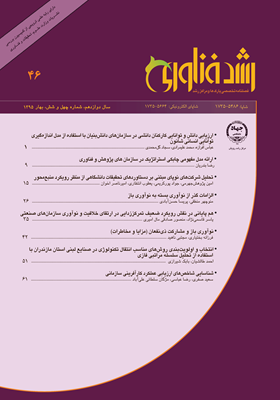تحلیل شرکتهای نوپای مبتنی بر دستاوردهای تحقیقات دانشگاهی از منظر رویکرد منبعمحور
محورهای موضوعی : Technology Management
امین پژوهش جهرمی
1
,
جواد پورکریمی
2
![]() ,
یعقوب انتظاری
3
,
امیر ناصر اخوان
4
,
یعقوب انتظاری
3
,
امیر ناصر اخوان
4
1 - دانشگاه صنعتی مالک اشتر
2 - تهران
3 - موسسه پژوهش و برنامه ریزی آموزش عالی
4 - صنعتي امیرکبیر
کلید واژه: شرکتهای نوپای دانشگاهی منابع رویکرد منبعمحور,
چکیده مقاله :
هدف از این پژوهش، تحلیل شرکتهای مبتنی بر دستاوردهای دانشگاه با استفاده از رویکرد منبعمحور و پاسخ به این پرسش است که چرا برخی شرکتهای دانشگاهی توان رقابت و امکان بقای بیشتری دارند. کارآفرینان دانشگاهی که در مراحل اولیه ایجاد کسبوکار درگیرند، با بحرانهای تصمیمگیری در حوزه تأمین منابع مواجهند. مطالعه درباره عوامل مهم زوال شرکتهای جوان نیز اغلب به کمبود منابع در سالهای اولیه شکلگیری منتهی میشود. لذا اطلاع درباره رابطه منابع و نقش آنها با بقای شرکتهای مبتنی بر تحقیقات دانشگاهی در سالهای اولیه، حیاتی است. این تحقیق از نظر هدف، از نوع پژوهشهای کاربردی و از نظر نحوه گردآوری دادهها، از نوع پژوهشهای کیفی و روش تحقیق، کتابخانهای (مطالعات ثانویه از نوع فراترکیب) و مبتنی بر مطالعه منابع اطلاعاتی برخط داخلی و خارجی بدون درنظر گرفتن قید زمانی است. پژوهش حاضر نتیجه میگیرد از آن جاییکه ساختار شرکتهای دانشگاهی متفاوت از شرکتهای غیردانشگاهی نیست و یکی از سه نوع شرکت محصولگرا، خدمتگرا و مالکیت فکری را تشکیل میدهد، دسترسی به منابع انسانی و فناوری (منابع اصلی و حیاتی شرکتهای دانشگاهی خدماتی و مالکیت فکریگرا) و کمیابی منابع سازمانی (منبع اصلی در فعالیت شرکتهای محصولگرا) در محیط دانشگاهی، توضیحدهنده علت موفقیت شرکتهای دانشگاهی خدماتی و مالکیت فکریگرا، و شکست شرکتهای محصولگرا است.
The aim of this study is to analyze the achievements of university-based start-ups using resource-based approach and answers the question of why are some academic start-ups more competitive and may have greater survival. Academic entrepreneurs are involved in the early stages of business creation, with a decision on the funding crisis facing. The study of important factors decline young companies, often leads to a lack of resources in the early years of formation. The Awareness about the relationship between resources and their role on survival of academic research-based companies in the early years is critical. This article seeks to identify the relationship that leads to more accurately understand the phenomenon of the commercialization of academic research achievements. Since the structure of start-ups based on the achievements of academic research is not something different from the structure of other start-ups and one of three forms of service oriented, Product oriented and Intellectual asset oriented start-ups, the research using library research (Meta-synthesis), concludes that access to human resources and technology and enterprise resource scarcity on campus, explain the success of academic Service oriented and Intellectual asset oriented start-ups and the failure of Product oriented firms. This led to the establishment of academic Service oriented and Intellectual asset oriented start-ups.
